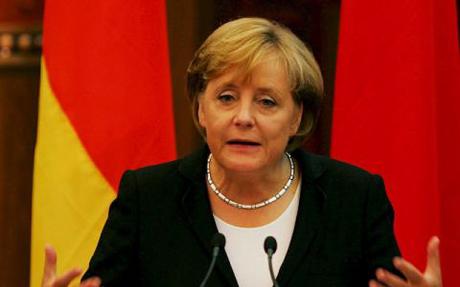ROUNDUP: German coalition declared solid, no election date change
 Berlin - Germany's coalition partners confirmed Monday that the country's general election would not be brought forward, despite recent cracks in the governing bloc as parties have begun to position themselves ahead of the polls due September.
Berlin - Germany's coalition partners confirmed Monday that the country's general election would not be brought forward, despite recent cracks in the governing bloc as parties have begun to position themselves ahead of the polls due September.
The Social Democrats (SPD), in coalition with Chancellor Angela Merkel's Christian Democratic Party (CDU), said Monday that the government coalition would continue to work together to address the country's economic crisis.
The SPD's General Secretary, Hubertus Heil, said the government needed to "do its duty" up until the general election on September 27.
"Election campaigns are an important part of democracy, but this must not lead to standstill," the SPD leader said.
Bavaria's Christian Social Union, in partnership with the CSU, also confirmed their intention to stay the course. Peter Ramsauer, the CSU representative in Berlin, said he had "no doubt whatsoever that the coalition government would keep going."
The opposition Liberal Democrats (FDP) on the other hand repeated a recent call for the election to be brought forward to June, when European Parliament polls are due.
"We don't want this chaos to continue until September," FDP leader Peter Ramsauer said on German WDR radio Monday. The FDP has its sights set on a future government coalition with the CDU.
There has been recent dissonance between the coalition partners over rescue plans for ailing carmaker Opel and Hypo Real Estate mortgage lender, as well as a string of proposals that the querulous government partners are failing to reach agreement over.
Monday's comments came after German Chancellor Angela Merkel gave an interview on prime-time television Sunday night, in which she sought to reassure viewers that the government was taking all necessary steps to address the country's economic downturn.
"The crisis is here, and I am the chancellor," Merkel told talk-show host Anne Will, at the start of the hour-long programme on ARD state broadcaster.
Merkel reinforced the message that, in principle, the state would support ailing enterprises saying, "a bridge should be built for every business that has a chance" to succeed.
Specifically, the chancellor said, such support would be made available for Opel, owned by US giant General Motors (GM).
"We, the state, will help - that is clear," Merkel said of the GM-subsidiary. The chancellor emphasised however, that conditions for state aid depended on decisions being made in the US about Opel's parent company.
Merkel showed herself confident that her coalition government were taking the correct steps to help resolve the crisis. "I think, so far we have done the right thing," she told the programme.
Overall, Merkel drew a positive balance of the advances made to date in tackling the global financial crisis, ahead of the Group of 20 (G20) gathering of the world's leading economies in early April.
This was the first time in more than two years that Merkel appeared on a talk-show to explain her policies to millions of television viewers.
The chancellor and CDU leader's message was that dealing with the financial crisis was more important than gearing up for general elections due in six months.
In a slanting criticism of those who positioned themselves against government policies, Merkel said that the SPD's chancellor candidate and current German vice-chancellor Frank-Walter Steinmeier "shouldn't grumble so much."
Merkel also said the FDP's opposition to a proposal enabling the government to take control of ailing banks was "absurd," and accused them of failing to offer constructive solutions.
The chancellor showed herself keen to present her CDU party as the safest pair of hands to steward the country's economy, suggesting that those who oppose the government are not acting in Germany's best interests.
The chancellor also justified her stance on two issues that have earned her criticism within her own CDU party.
Merkel said her critique of Pope Benedict's handling of ultra-conservative Bishop Richard Williamson was necessary, and defended her role in a dispute between Poland and Germany regarding a memorial for expellees.
Merkel's television appearance Sunday was preceded two weeks ago by an interview in German daily tabloid Bild. The chancellor also defended government policies on German Deutschlandfunk radio last week. (dpa)